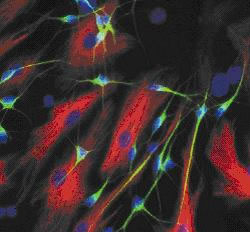Researchers have discovered how a class of supporting cells found in the brain and dismissed previously as little more than "neuronal glue" actually play a critical role in regulating respiration.
Writing in Science, UCL scientist Alexander Gourine and his colleagues show that a family of "astrocytes", cells that support and nourish nerve cells but were not thought to play a processing role in the brain, are equipped with carbon dioxide detectors and fire off signals to nerve cells when levels climb too high.
 The astrocytes, which are located in the brainstem close to the nerve networks that control breathing, extend foot-like projections onto blood vessels, enabling them to chemically sample the passing blood to register levels of carbon dioxide and blood acidity. If this rises, the astrocytes respond, the team found, by flooding themselves with calcium.
The astrocytes, which are located in the brainstem close to the nerve networks that control breathing, extend foot-like projections onto blood vessels, enabling them to chemically sample the passing blood to register levels of carbon dioxide and blood acidity. If this rises, the astrocytes respond, the team found, by flooding themselves with calcium.
This signal is propagated across the network of astrocytes like an electrical Mexican wave to contact points with nerve cells onto which the astrocytes administer a chemical wake up call in the form of a substance called ATP.
This causes the neurones to up the respiratory rate, helping to remove CO2 from the body and boost oxygenation.
The discovery of this systems sheds new light on how the brain controls breathing and could help doctors to better understand respiratory conditions such as sleep apnoea and even sudden infant death syndrome.










Comments
Add a comment